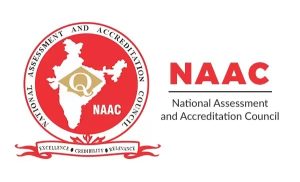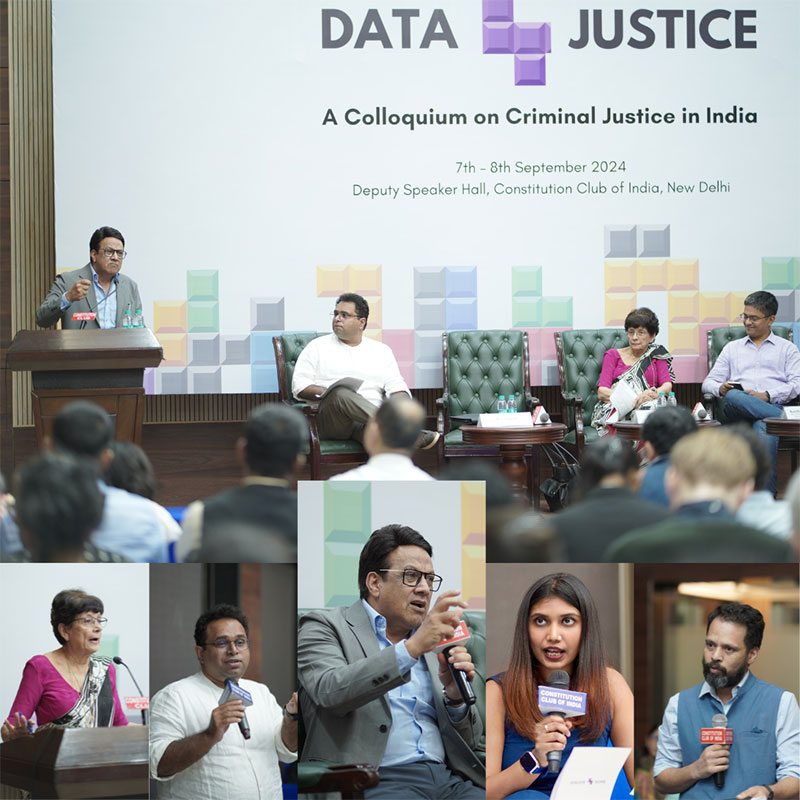The Data for Justice Colloquium held at the Constitution Club of India on the 7th and 8th of September 2024, brought together scholars, practitioners, and policymakers to discuss the intersection of data, technology, and criminal justice in India. The colloquium was organised by National Law University Delhi (through the SK Malik chair on Access to Justice) in collaboration with the India Justice Report and covered various topics related to the collection, management, and use of data in the Indian criminal justice system. The discussions emphasised the importance of data-driven decision-making, while also highlighting the limitations and challenges faced by the justice system in effectively utilising data.
The colloquium was a two-day event which was divided into four sessions. The colloquium commenced with an insightful address by Prof. G.S. Bajpai (Vice Chancellor, National Law University Delhi). In his opening remarks, Professor Bajpai underscored the pressing gaps in India’s criminal data collection system. In this invigorating speech he highlighted significant gaps and improved methods to capture critical information like FIR, bail records and sentencing patterns. Following Professor Bajpai’s remarks, Maja Daruwala (Chief Editor, India Justice Report) gave reflections drawn from her 40 years of experience in the legal field. She pointed out that while the India Justice Report plays a critical role in ranking states based on government data, an overreliance on static data can often present an incomplete picture. In her warm welcome she advocated for incremental improvements and better collaboration in data justice. Karthik Muralidharan (Tata Chancellor’s Professor of Economics, University of California, San Diego) discussed the challenges faced by India in delivering basic services due to low state capacity and inefficient spending. The first session chaired esteemed panellists namely Prof. Ashwini Deshpande (Professor and Head, Department of Economics; Founding Director, Centre for Economic Data and Analysis, Ashoka University), Swagata Raha (Head, Research and Co-Head Restorative Practices, Enfold India) and Justice S. Muralidhar (Former Chief Justice, High Court of Orissa & Senior Advocate, Supreme Court of India). The session emphasised the significance of data in criminal justice, especially during the pandemic. The second session explored different approaches to handling data in the criminal justice system. Shreya Rastogi (Director Forensics & Death Penalty Litigation, Project 39A, National Law University Delhi), Christoph Goesmann (ETH Zurich & Development Data Lab), Mahesh Vyas (Managing Director & CEO, Centre for Monitoring Indian Economy), Anshul Aggarwal (Technology & Development Solutions Cell, IIT Bombay) where reliability of forensic evidence in India, fairness and efficiency in judicial process, large scale data collection, and structural composition behind data and judicial analysis was pondered upon amongst other things.
The second day began with a session on the challenges of working with official criminal justice data in India. Valay Singh (Lead, India Justice Report), Pooja Satyogi (Assistant Professor, School of Law, Governance and Citizenship, Dr. B.R. Ambedkar University, Delhi) and Vijay Raghavan (Professor, Centre for Criminology and Justice, School of Social Work, Tata Institute of Social Sciences) focused on understanding data sharing among agencies, so that difficulties faced by lawyers in accessing data can be mitigated. The Final Session had Apar Gupta (Advocate, Delhi & Co-Founder, Internet Freedom Foundation), Rukmini S. (Independent Data Journalist; Founder, Data for India; Author, Whole Numbers and Half Truths) Aparna Chandra (Professor of Law, NLSIU, Bengaluru), Mohan Gopal (Founder Chair, National Court Management Systems Committee – Supreme Court of India (2012-2019)) which underscored the risks associated with public surveillance, role of data in public understanding of issues like bail. The colloquium received active and engaging participation from the audience, leaving space for taking these important conversations forward.
The organising committee, comprising of Maja Daruwala (Chief Editor, India Justice Report and Senior Advisor, Commonwealth Human Rights Initiative), Anup Surendranath (Professor of Law & SK Malik Chair Professor on Access to Justice, NLU Delhi), Valay Singh (Lead, India Justice Report), Bharti Yadav (Assistant Professor, NLU Delhi), and Prerna Deep (Academic Fellow, NLU Delhi and Associate Coordinator, Centre for Criminology and Victimology, NLU Delhi), extends its heartfelt gratitude to Prof. G.S. Bajpai (Vice-Chancellor, NLU Delhi) and Prof. Ruhi Paul (Registrar, NLU Delhi) for their invaluable support in making this colloquium a success. The organising committee also acknowledges the efforts of student volunteers in facilitating the event.





